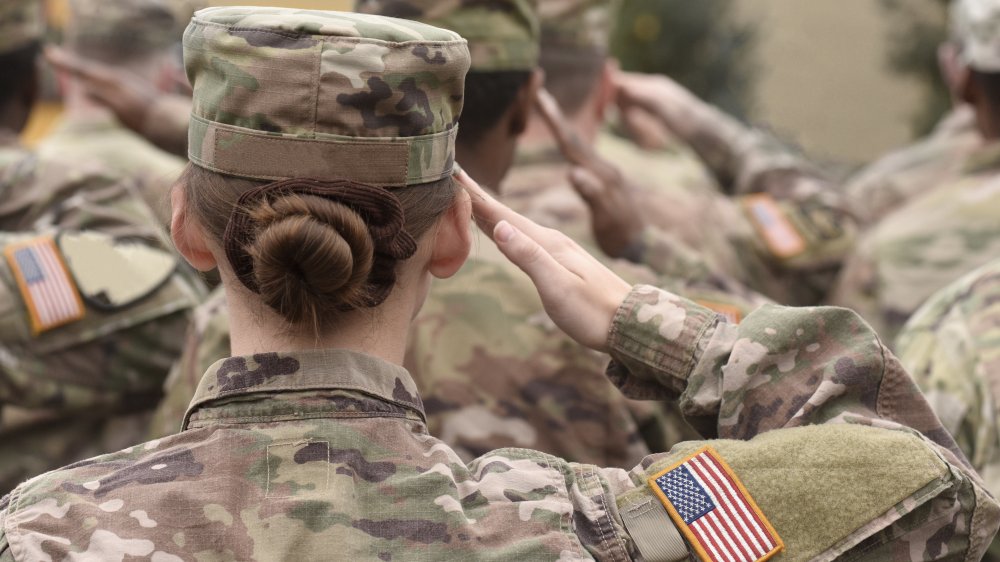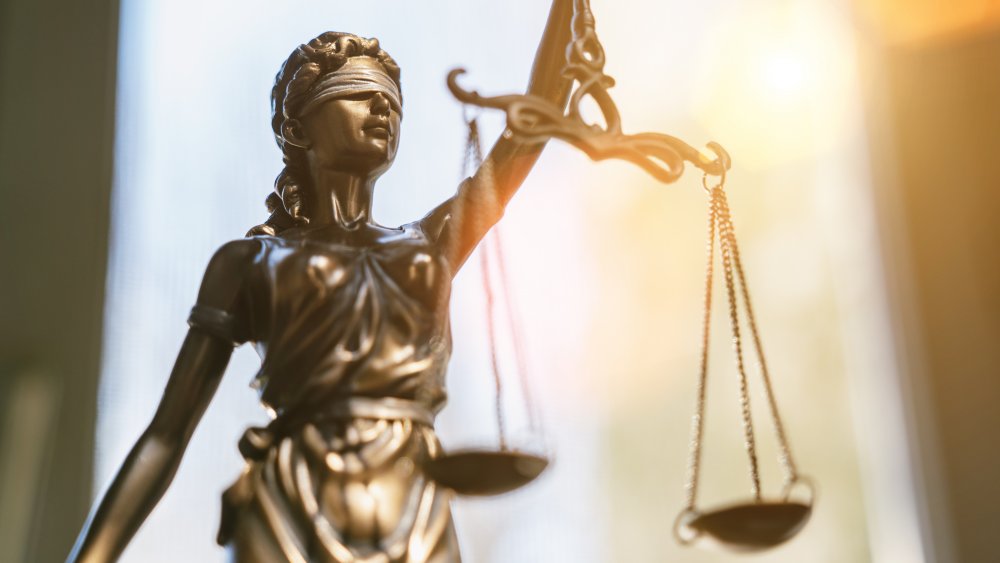These Are The 5 Things Presidents Can't Do
Being president comes with a few cool perks: you get your own jet (Air Force One), you get to live in this old house that kids on field trips can tour, and you get to hide out in an underground bunker if the apocalypse suddenly hits on a Tuesday. Of course, the presidency may be "the highest office in the land," but he is no autocrat, let alone dictator. After all, that's the kind of ruling class and non-egalitarian system of government that the United States' forefathers wanted to do away with. Hence, the complex and interconnected set of checks and balances that make up the power division of the three branches of the United States' government: legislative (Congress), executive (President), and judicial (Supreme Court).
The President, then, as outlined by the Truman Library, is just one facet of the government, albeit the one that typically receives the most attention (humans just love a good alpha, don't they?). The President's duties, like any job, are pretty clearly outlined, even though there's some wiggle room here and there. Issues really only arise when the person in charge tries to overstep his or her boundaries and cross into the territory of the other branches of government.
The President can do a lot, yes, but there are definitely some things that he or she absolutely cannot do.
The president cannot make laws
There's been some hullabaloo in recent years about executive orders, all listed on the Federal Register, but they definitely fall under the president's "executive" role — like an administrator signing some documents. They aren't laws, or commandments. The President can't make any law at all, actually. The President can pass a bill, or veto it: that's it. Once passed, it's referred to as a law. If a bill is vetoed, it can still be passed without President's approval with a 2/3 approval in both the Senate and the House of Representatives (the two halves of Congress). The power to create new laws, then, falls to the aptly named "legislative" branch of the government: Congress.
Take the Affordable Care Act, for instance, which became public law on March 23, 2010, as described on Congress.gov. This piece of legislation took years to pass, through a bipartisan effort within Congress, as the Commonwealth Fund explains. The law, which has given 20 million Americans healthcare coverage, was something President Obama really wanted to do, but he himself couldn't make it happen. Simply by working together, across the aisle, did the members of Congress (some more begrudgingly than others) finally hammer out all of its details and push it through. At that point, President Obama's role was merely to sign the bill into law.
The president cannot declare war
In the US Constitution, readable on Senate.gov, the President is referred to as the Commander in Chief. Nice title, sure, but it doesn't mean that the President is bellowing his way through a battlefield with a raging case of battleaxe wrath. It just means that once war is underway, the President can have the final say on the overarching decisions of the branches of the military — Army, Navy, and Air Force — contained within the Department of Defense (DoD), as stated on WhiteHouse.gov. The Secretary of Defense is the liaison between the DoD and the President. The military itself, though, is supposed to be a politically neutral body that simply carries out orders.
It's Congress that has the power to officially declare war — for instance, after the attack on Pearl Harbor, when we entered World War II. Since then, we all know that US has been involved in plenty of combat, as Time outlines: Korea, Vietnam, the Persian Gulf, Afghanistan, Iraq. But those weren't technically "wars," despite all the, you know, killing and guns and bombs. There's some issue with terminology here, and perhaps some disingenuousness, but those operations were "extended military engagements." With an official declaration of war, there are changes to rules of engagement, explained on Britannica. A "war" is something sanctioned, internationally, which allows for protection of civilians and other "play by the rules" decisions.
So in the end, it's still technically true that a President can't declare "war."
The president cannot decide how federal money will be spent
What exactly happens with all the tax money that we, the citizens of the United States, give to the federal government to let all those folks do their jobs of representing our interests and protecting our freedoms? (Feel free to laugh tragically and/or ironically at any point here.)
As it turns out, decisions regarding how to use federal money fall to a collaboration between the executive branch (President) and the legislative branch (Congress). Just as Congress can draft a bill and the President can approve it, it's the President who drafts a budget and Congress who approves it. As USA.gov explains, various agencies and governmental departments pass along their budgetary requests to the President, who builds a composite and ships it off to Congress. Then begins the endless tinkering of versions of the budget that a separate conference committee (composed of particular members of Congress) votes on. These versions are passed on to different governmental Cabinets (Agriculture, Defense, Commerce, Housing and Urban Development, etc.) who help draft bills that the President has to sign into law before the budgets are distributed. Phew ... got all that?
Even though the President is involved in proposing the initial, overall budget, and signs into law the final versions of each department's budget, he or she is not involved in the actual decisions regarding how budgets are used.
The president cannot interpret laws
Some presidents have pretty big mouths and tend to polarize the public with rhetoric or just plain old rabble-rousing. Others are more modest. Presidents can have whatever opinion they want, just like any other citizen. Love Battlestar Galactica but hate Farscape? Cool, bro. Love Heineken but hate Miller Genuine Draft? Yeah man, you do you. Presidents can think whatever they want, personally, and like anyone else hanging out at Thanksgiving dinner or in the back of a dive bar, believe that they have the correct interpretation of a piece of legislation. The President cannot, however, enforce an interpretation of a law. That job, friends, belongs to the Supreme Court.
Such was the case with Roe v Wade, for example, a 1973 court case where the Supreme Court ruled 7-2 that governments lacked the power to prohibit abortion. As the BBC explains, that right falls to the individual, as an issue of "freedom of personal choice in family matters as protected by the 14th Amendment of the US Constitution." Cases can make their way up to the Supreme Court from the state level if results are disputed. At that point, the Supreme Court can choose to review the case or not, as AZCourts describes. So when Norma McCorvey (pseudonym, "Jane Roe") decided to challenge a Texas ruling saying that abortion was illegal, the Supreme Court got involved.
Note the distinct lack of any Presidents involved during this process.
The president cannot choose cabinet members or Supreme Court Justices without Senate approval
The judicial branch of the government is the Supreme Court, with the power to decide how to interpret a law. The effects of their decisions are massive and widespread, can last decades, and affect millions of lives. Because being a Supreme Court Justice is a lifelong appointment, it's a pretty big decision as to who will be appointed. This is why even though presidents can choose who they prefer to be a Justice, it's Congress who has to approve the decision. Same thing with Cabinet members, who compose those super-important governmental departments like Energy, Labor, Education, Homeland Security, and so on, per WhiteHouse.gov.
Because these positions are so relevant, it's a pretty good idea to keep the approval of their appointments split between both the executive branch (President) and the legislative branch (Congress). Problems arise (despite their best efforts, the founding fathers didn't build a totally bulletproof government) when collusion or political agendas invade what are otherwise supposed be bodies of impartial arbiters of law — a red flag/danger zone for a truly democratic process that represents the interests of all of the nation's diverse citizens.





